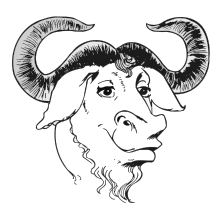 | |
| Original author(s) | James Clark |
|---|---|
| Developer(s) | GNU Project |
| Initial release | June 1990 |
| Stable release | 1.23.0[1] |
| Repository | |
| Written in | C++ |
| Type | Typesetting |
| License | 2009: GPL-3.0-or-later[a] 1992: GPL-2.0-or-later[b] 1990: GPL-1.0-or-later[c] |
| Website | gnu |
groff (/ˈdʒiːrɒf/ JEE-roff)[5] (also called GNU troff) is a typesetting system that creates formatted output when given plain text mixed with formatting commands.[6] It is the GNU replacement for the troff and nroff text formatters, which were both developed from the original roff.
Groff contains a large number of helper programs, preprocessors, and postprocessors including eqn, tbl, pic and soelim. There are also several macro packages included that duplicate, expand on the capabilities of, or outright replace the standard troff macro packages.
Groff development of new features is active, and is an important part of free, open source, and UNIX derived operating systems such as Linux and 4.4BSD derivatives — notably because troff macros are used to create man pages, the standard form of documentation on Unix and Unix-like systems.
OpenBSD has replaced groff with mandoc in the base install, since their 4.9 release,[7] as has macOS Ventura.
- ^ Bertrand Garrigues (7 July 2023). "Groff version 1.23.0". Retrieved 2 August 2023.
- ^ "1.20: Update GPL2 to GPL3".
- ^ "1.06: ChangeLog".
- ^ "1.02: groff.c".
- ^ Laha, Manas (17 June 2003). "An Introduction to the GNU Groff Text Processing System" (PDF). Archived from the original (PDF) on 2 Feb 2017.
- ^ "GNU troff (Groff) — a GNU project". www.gnu.org. Retrieved 2017-01-28.
Groff (GNU troff) is a typesetting system that reads plain text mixed with formatting commands and produces formatted output.
- ^ Changes made between OpenBSD 4.8 and 4.9
Cite error: There are <ref group=lower-alpha> tags or {{efn}} templates on this page, but the references will not show without a {{reflist|group=lower-alpha}} template or {{notelist}} template (see the help page).